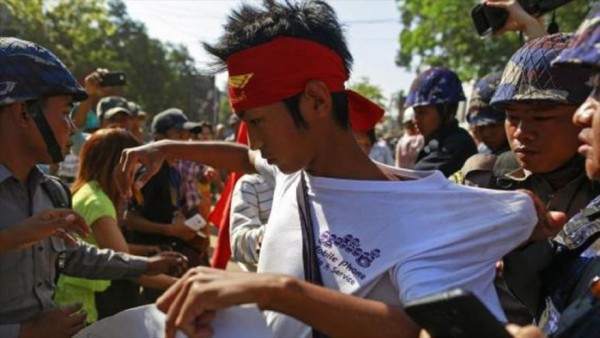On the third consecutive day of anti-government demonstrations in Myanmar (Burma), five college students were arrested Friday in the city of Leptadan (southeast), local media reported. The demonstrations had over 200 students taking part and police tried to disperse the crowd using tear gas. “Some students escaped through police barriers and joined the people who came to support our strike,” said Thway Thit Min, who was not afraid to speak with reporters.
Protesters took to the streets to protest a bill – National Education Law – approved last September by the government where they took all the decision making power about educational reforms away from universities and gave same to the government ministers. This restricts academic independence say the students, and authorizes the government rather than the universities to attend to matters that concern education and any reforms that are needed to accompany societal changes.
Kyaw Ko Ko, president of the All Burma Federation of Student Unions (ABFSU), an umbrella group for all students in the country, called any crackdown “illegal” and demanded justice for the protesters.
What is reported as hundreds of students began to march over a month ago from the central city of Mandalay, and the march was gathering other young people to its cause but eventually, the police stopped them, in Letpadan, about 140km from the capital Yangon, the final destination of the protesters. Yangon is where protests in 1988 touched off a pro-democracy movement in then junta-ruled Myanmar.
Authorities had released the eight people detained a day earlier during demonstrations in Yangon itself, members of the 88 Generation pro-democracy group, who were calling on the government to accept responsibility for the crackdown in 1988.
A complaint by the marchers was, who is responsible for recruiting ad hoc thugs who, with the simple tying-on of red armbands, seem empowered to make arrests?
Apparently, Buddhist monks and ordinary citizens joined them along the way and over time more precise demands were being formulated along the lines of calls for the decentralization of the education system, change the university entrance exam requirements, modernise the national syllabus, for the right to form student unions, and instruction in the country’s ethnic minority languages.
Myanmar students protest Gov’t education law
-










